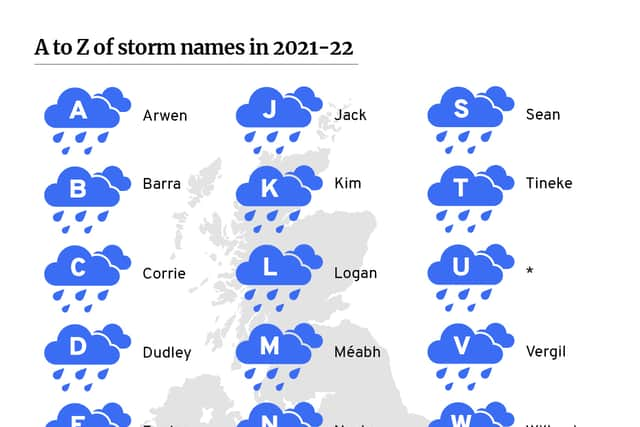UK storm names 2022: how Storm Franklin got its name, list of recent Met Office storms, Storm Gladys meaning
This article contains affiliate links. We may earn a small commission on items purchased through this article, but that does not affect our editorial judgement.
and live on Freeview channel 276
It’s that time of year again when we can expect rain, hail, winds and red weather warnings.
From hurricane Bawbag to storm Karen (she’d like to speak to a manager), the UK began naming adverse weather systems in 2015.
Advertisement
Hide AdAdvertisement
Hide AdThe storm season begins in September and so the alphabetic list of potential storms renews then too, with Storm Dudley and Storm Eunice currently circling.
The Met Office has now revealed the names of all the storms we could experience in the year ahead, as well as revealing where some of the names came from.
Here is the full list of names (which never features letters Q, U, X, Y or Z) and where some of them originate from.
Why does the UK name storms?
The idea originated in the US and was adopted by the Met Office in 2015, in a bid to make the public more aware of adverse weather conditions and how dangerous they can be.
Advertisement
Hide AdAdvertisement
Hide AdThe Met Office has since ran a campaign called ‘#NameOurStorms’ which allowed members of the public to nominate a name.
This year, over 10,000 entries were made and 21 names have been chosen. The names will not be confined to storms experienced in the UK, as Ireland and the Netherlands use the same list.
Will Lang, head of the National Severe Weather Warning Service at the Met Office, said of the naming scheme: "We’re all aware of some of the severe weather that has been witnessed across Europe and globally in recent months and we work to use any tool at our disposal to ensure the public is informed of potential risks, and naming storms is just one way we do that."
KNMI director-general Gerard van der Steenhoven said: "Storms are not confined to national borders - it makes a lot of sense to give common names to such extreme weather events."
What constitutes a storm which needs a name?
Advertisement
Hide AdAdvertisement
Hide AdStorms will be given a moniker when they are predicted to cause medium or high impacts from strong winds, rain or snow.
The past year has seen five officially named storms, including the latest Storm Evert - causing damage to homes and businesses due to extreme wind, rain and flooding.
We have not gone further than K - Storm Katie, which hit the UK on Easter Monday 2016.
What names have been chosen this year?
The first storm of the 2021/2022 season will be Arwen, a name of Welsh origin and popularised by JRR Tolkien’s Lord Of The Rings books.
Advertisement
Hide AdAdvertisement
Hide AdOther names have been chosen as a result of people sharing their name - such as Kim, nominated in recognition of a "whirlwind" relative and a self-confessed weather watcher.


Here is the full list of names for this year:
- Arwen
- Barra
- Corrie
- Dudley - chosen through Twitter after being submitted by a couple who will share the last name of Dudley when they get married in 2022
- Eunice
- Franklin
- Gladys
- Herman
- Imani
- Jack
- Kim
- Logan - Scottish origin, was nominated by several parents and grandparents, including a mention of a grandson who "runs through the house like a tornado" and another who is "as quick as lightning" when playing as a goalkeeper.
- Méabh
- Nasim
- Olwen
- Pól
- Ruby - nominated by a pet owner whose cat "comes in and acts like a storm" and a parent whose daughter "leaves a trail of destruction" when she enters the house.
- Sean
- Tineke
- Vergil
- Willemien
A message from the editor:
Thank you for reading. NationalWorld is a new national news brand, produced by a team of journalists, editors, video producers and designers who live and work across the UK. Find out more about who’s who in the team, and our editorial values. We want to start a community among our readers, so please follow us on Facebook, Twitter and Instagram, and keep the conversation going.
Comment Guidelines
National World encourages reader discussion on our stories. User feedback, insights and back-and-forth exchanges add a rich layer of context to reporting. Please review our Community Guidelines before commenting.
